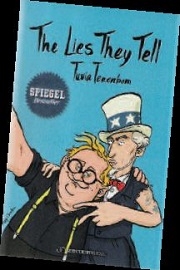The Lies They Tell - A Book Review
The Lies They Tell
by Tuvia Tenenbom
Gefen Publishing House, 2016Soft Cover, 406 pages. NIS 98
ISBN: 978-965-229-911-6
Reviewed by Carl Hoffman
I did not particularly like this book when I began to read it. We are often influenced by whatever we read immediately before, and I had just finished reading Paul Theroux's The Happy Isles of Oceania: Paddling the Pacific about one hour before I started Tuvia Tenenbom's latest book. Theroux's 1992 733-page travel book was a superbly written, impressively knowledgeable, insightful, sensitive, and deeply personal account of a lone voyage across the Pacific, from Australia to Easter Island, with a final chapter chronicling the end of his journey watching a solar eclipse in Hawaii.
Compared to that, Tenenbom's account of his six month escapade across the United States struck me as shallow, sophomoric, adolescent, flippant and gratuitously wise-ass. But as I kept on reading, the book began to grow on me, to the point where these erstwhile deficiencies began to turn into strengths. The Lies They Tell is, in fact, a delightfully irreverent, extremely insightful, often hilarious, and ultimately contemptuous look at what Tenenbom says is neither "the land of the free" nor "the home of the brave".
Tuvia Tenenbom grew up and spent the first portion of his life in Israel. He moved to the United States around 30 years ago, living part of the time in New York, where he founded and directs the Jewish Theater of New York; and the rest of his time in Germany, where he writes articles for the newspaper Die Zeit, and books for the publishing company Suhrkamp.
His first book, I Sleep in Hitler's Room, focused on the life of a Jew in present-day Germany. His next was Catch the Jew! - a witty, acerbic, no-holes-barred look at Israel and the Palestinian Authority. As both of these were bestsellers in their German editions, Tenenbom was not surprised when his editor at Suhrkamp asked him to close the circle with another book, this time casting his savage, unsparing eyes upon the United States.
The only problem with this idea was that when Tenenbom left Israel for the United States, the "United States" to which he immigrated was specifically New York City, which he rarely if ever left. Tenenbom can perhaps be forgiven for this; the same can be said for many native New Yorkers. The leitmotif of The Lies They Tell is thus: "For many years I thought that I knew something about America, but do I? The truth is that I have no clue." Tenenbom realized that he would have to discover it "bit by bit, soul by soul, state by state." He concludes this reverie by asking himself, "Who knows where this, my journey, will lead me?"
Tenenbom's journey in fact led him to virtually every corner, every nook and cranny of the country, from big cities like New York, Philadelphia, Washington and San Francisco to small Midwestern and southern towns that I, for one, had never heard of. He met people who literally ran the gamut of American types—left wingers, right wingers, hypocritical liberals, angry conservatives, self-hating Jews, self-destructive American Indians, the young, the old and literally everything in between.
An inveterate cigarette smoker, Tenenbom's first observation about contemporary American mores and folkway is that it is easier, and more acceptable, to buy a shotgun in today's United States than it is to find a place where one can light up and smoke a Marlboro.
Perhaps not surprisingly, Jews and Israel are never far away from the narrative. His observations are sometimes funny, as when he declares that people who believe in climate change are always pro-Palestinian, and those who do not believe in climate change are invariably pro-Israel. Tenenbom becomes more serious, however, when talking about liberal groups like the Quakers in Philadelphia, who grieve for the "poor Palestinians" a half a world away, while remaining totally indifferent to the crushing poverty of Blacks in ghettos no more than five miles away from their Quaker meeting house. "English has a word for this," he says. "It's called hypocrisy." Tenenbom's greatest ire, however, is reserved for "liberal, self-hating" American Jews, who are not only indifferent to Jewishness but despise the State of Israel.
Tenenbom ranges far and wide, describing, for example, the poverty in the Black Chicago district that voted Barak Obama into Congress before he became president. He asks a resident of the area whether Black lives changed for the better during the Obama administration, who tells him, "Yes. One black family moved to a better house. That's it. He lives in the White House; we live here. No change for us." Upon arriving in Seattle and being told that the city was named after an American Indian chief, Tenenbom muses, "The American habit of naming streets and cities for the people their ancestors murdered is something I don't really get. Imagine Germany getting into this habit. Would be fun. Berlin would be called Abraham and Hamburg would be named Sarah."
Strictly speaking, The Lies They Tell is neither a "travelogue" in the conventionally understood sense of the term, nor is it really "journalism". Tenenbom quotes the people who gave him good "sound bytes", while no doubt many more people who were perhaps less interesting but more representative of today's America were ignored. Nonetheless, the book is a rollicking great read, and one that I highly recommend.








Comments